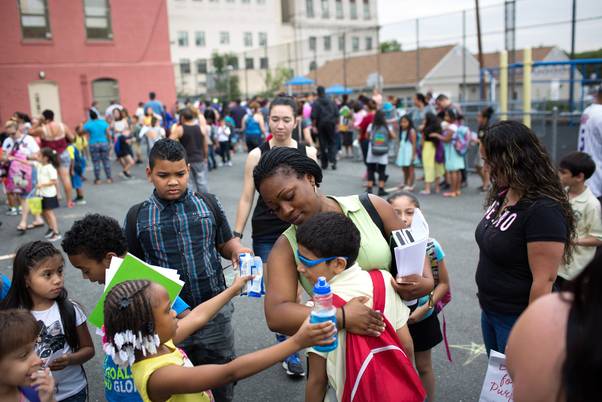As New Jerseyans turn the page into a new school year, the state’s political and educational landscapes are colliding in meaningful ways. From growing high school enrollments and debates over homeschooling to labor rights and Project Labor Agreements (PLAs), the issues at the forefront this fall are shaping the daily lives of families, students, and workers alike.
High School Growth and Shifting Education Trends
Some of the largest high schools in New Jersey are continuing to expand, highlighting both opportunity and concern for local communities. Passaic County Technical Institute now enrolls more than 3,400 students, making it one of the most populous high schools in the state. Rapid growth in schools like this raises questions about resource allocation, classroom sizes, and whether districts can maintain personalized education while serving record-breaking numbers of students.
Meanwhile, a growing number of school districts are revisiting the issue of later start times, responding to research that shows adolescents benefit from additional morning rest. Advocates argue this move could improve attendance, academic outcomes, and overall student well-being. But the logistical ripple effect — from bus schedules to after-school activities — continues to spark debate in communities across the state.
On another front, New Jersey is seeing renewed debate over homeschooling regulations. State proposals for new oversight — spurred by a tragic child abuse case — have divided parents and policymakers. Supporters argue that increased regulation would protect children’s safety and educational outcomes, while opponents maintain that greater government involvement would infringe on parental rights.
For readers who want to follow the latest coverage on New Jersey’s school and sports communities, Explore New Jersey offers a dedicated section here: High School Sports.
Newark Schools: A Positive Shift
In Newark, public schools are reporting progress in two key areas: improved attendance for the 2024–25 school year and the launch of college savings accounts for kindergarten students. Thanks to a new grant program, families now have an early financial boost to begin preparing for higher education. Both developments are being touted as positive steps for one of the state’s largest and most scrutinized school districts.
This momentum comes at a time when the state is also emphasizing mental health support in education. A statewide Mental Health Summit for Schools is scheduled for November, bringing together educators, policymakers, and community leaders to address rising concerns about student and staff well-being.
Back-to-School Events Across the State
Across New Jersey, communities are kicking off the school year with celebrations and support initiatives. Edison hosted its annual “Back2School Bash”, while Long Branch organized a “Back to School Giveaway” aimed at providing supplies and essentials to families in need. These local events reflect the broader commitment of New Jersey towns to create welcoming environments for students returning to class.
Labor Politics Take Center Stage
Education isn’t the only pressing issue this season. With Labor Day approaching, New Jersey politics is equally focused on the rights of working families and unionized labor. Assemblyman Anthony Verrelli (D-15), chair of the Assembly Labor Committee, is seeking reelection this year on a ticket with U.S. Rep. Mikie Sherrill (D-11).
A carpenter by trade and a longtime advocate for organized labor, Verrelli has been vocal about what he expects from candidates.
“I want to hear, ‘I don’t only stand with Labor, but I stand behind all facets of organized Labor — to allow people to make a living wage and benefits so they can live and retire with dignity,’” he said.
For Verrelli, support of Project Labor Agreements (PLAs) remains a defining issue. State law requires PLAs on capital projects with estimated costs above $5 million, ensuring fair wages, safe conditions, and union protections for skilled tradespeople.
The debate around PLAs underscores a sharp political divide. Republicans like Jack Ciattarelli have historically opposed such measures, citing concerns about costs and government overreach. Labor groups, however, argue that opposition to PLAs is a direct attack on the wages and job security of thousands of workers.
By contrast, Sherrill has consistently supported PLAs and prevailing wage standards, advocating for strong labor protections at both the state and federal levels. Verrelli has made it clear: the next governor must not only preserve gains for labor but also enforce them by ensuring that the Department of Labor has the resources to hold violators accountable.
“At the end of the day, it’s about the working people of New Jersey who live and work in New Jersey, so they can spend the money they make here,” Verrelli emphasized.
Where Politics, Schools, and Communities Intersect
This fall, the stories of education and labor are more interconnected than they may first appear. Expanding schools require new construction, where PLAs could play a vital role. Later start times and mental health initiatives reflect growing awareness of the pressures facing both students and educators. And events like Newark’s college savings plan or Long Branch’s community giveaway showcase how political decisions, policy changes, and grassroots efforts shape the everyday lives of New Jersey families.
As the state prepares for another election season, the issues of schools, labor rights, and community well-being will remain front and center. Whether in classrooms, union halls, or town squares, New Jerseyans are making their voices heard — demanding fair opportunities for students and secure futures for working families.












